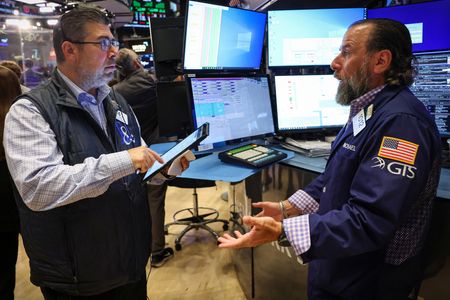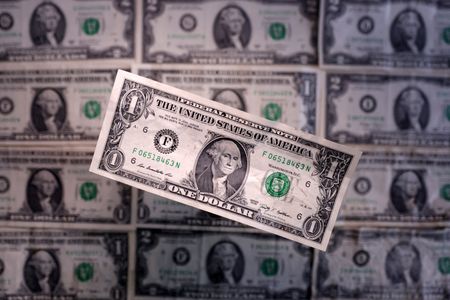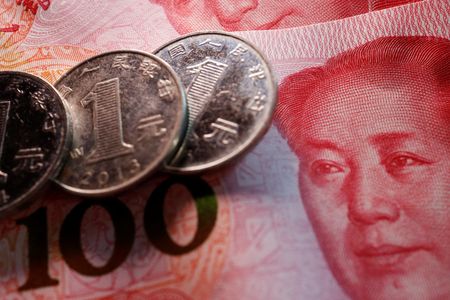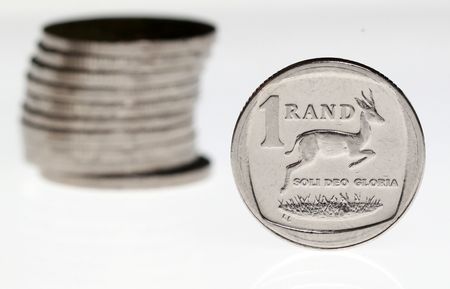By Jaspreet Kalra and Noel Randewich
MUMBAI/SAN FRANCISCO (Reuters) -Wall Street shares dropped on Wednesday, with a tech selloff extending into a second day, while a key meeting of central bankers later this week remained in focus for currency and rates traders.
The S&P 500 declined 0.5% and the tech-heavy Nasdaq Composite dropped 1.1%, adding to a steep decline on Tuesday. The Dow Jones Industrial Average was down 0.1%.
Analysts blamed a confluence of factors for the weakness in tech stocks, including concerns over steep valuations, investors exiting profitable positions, and risk aversion.
“To me, tech was overbought,” said Seth Hickle, managing partner at Mindset Wealth Management. “We had really good earnings, and now it’s kind of natural for the market just to sell some of that good news.”
Wariness over U.S. President Donald Trump’s growing influence over tech companies has also been in focus for investors. U.S. Commerce Secretary Howard Lutnick is looking into the government taking equity stakes in Intel and other chip companies, two sources told Reuters.
That follows other unusual revenue-sharing deals Washington recently struck with artificial intelligence chip giant Nvidia and Advanced Micro Devices.
While the individual developments may be brushed aside by markets, they fall into the broader bucket of concerns over the institutional framework in the United States, Laidler said.
AI heavyweights Nvidia, Broadcom, Meta Platforms, Amazon and Alphabet were all down more than 1%. The Nasdaq is down about 2.5% over the past two sessions.
European shares rose, with the pan-European STOXX 600 index up 0.25%. Britain’s FTSE 100 rallied 1.17% to a record high, boosted by gains in consumer and healthcare companies.
FOCUS ON JACKSON HOLE
The U.S. dollar weakened slightly against a basket of peers after Trump called on Federal Reserve Governor Lisa Cook to resign.
The 10-year U.S. Treasury yield eased to 3.29%, while the 2-year Treasury yield slipped to 3.74%.
The focus is now on the Federal Reserve’s August 21-23 Jackson Hole symposium, where Fed Chair Jerome Powell is due to speak on Friday on the economic outlook and the U.S. central bank’s policy framework.
Powell’s remarks on the near-term outlook for interest rates will be keenly watched as traders are almost fully pricing in a rate cut next month.
“Even if Federal Reserve Chair Jerome Powell emphasises muted unemployment over sharply revised payrolls, that would be a hard sell to both the White House and a market that is pricing in 21 bp of rate cuts for September,” analysts at ING said in a note.
The minutes of the Fed’s July policy meeting due later on Wednesday are unlikely to spur meaningful market reactions as they predate weak U.S. labor market data that firmed rate cut expectations.
Elsewhere, Sweden’s central bank kept its key interest rate on hold as expected, while the Reserve Bank of New Zealand cut policy rates to a three-year low and signaled further easing, sending the kiwi down by more than 1%.
Consumer prices in Britain climbed 3.8% in July, data showed, the fastest annual rise for a Group of Seven economy.
The data nudged sterling higher but it quickly pared gains, while the fact that inflation was not even higher prompted a rally in government bonds. The benchmark 10-year gilt yield was last down 7 basis points at 4.68%.
Oil prices climbed about 1% on a bigger-than-expected weekly drop in U.S. crude inventories as investors awaited the next steps in talks to end the Ukraine war, with sanctions on Russian crude remaining in place for now.
Spot gold rose 0.8% to $3,339.69 an ounce. [GOL/]
(Reporting by Jaspreet Kalra, Editing by Sonali Paul, Mark Potter, Alex Richardson, Noel Randewich and Richard Chang)











